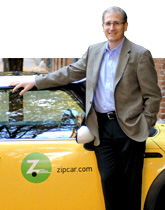He could almost smell the soft, flaky bread rising and hear the ding-ding of the oven timer. Josh Dowd (S’10) wants a Pillsbury® Crescent roll. But how can he get to the store? Maybe he should break down one of these days and just buy a car. But a car is a lot of money. Plus there is gas, insurance, parking. Forget taking a bus to the store. He doesn’t have the patience to stand around waiting for the 61C.
Then he remembers a forwarded email he received from a friend earlier in the day. He quickly goes to his computer and begins scrolling through his inbox. There it is: Zipcar.
A few hours later, Dowd and his roommates were driving to the store in Zipcar’s Volkswagen Jetta. Dowd says he used Zipcar 15 times last semester, 14 times for Crescent roll runs and once to take his girlfriend out.

While his girlfriend might be upset over her boyfriend’s misguided love for Crescent rolls, Zipcar chair and CEO Scott Griffith (E’81) loves to hear he has another satisfied customer. What’s not to like? With Zipcar, after paying an annual membership fee, you pay a flat rate, hourly or daily, for some wheels that include a full tank of gas and designated premium parking places around the campus and city.
Zipcar, which recently merged with Flexcar, is the world’s largest car-sharing service, with 180,000 members who have access to 5,000 vehicles in more than 50 markets in the United States, Europe, and Canada, including most major cities. Among the dozens of colleges that have partnered with Zipcar, including Carnegie Mellon, are MIT, Columbia, Georgetown, and Harvard.
Griffith didn’t set out to become a CEO. Born and raised in a Pittsburgh suburb, he wasn’t sure what he wanted to do. He had a passion for cars and their future. He figured he’d get some answers by becoming a mechanical engineer, and he says he knew just where to go.
It wasn’t until his junior year, after taking an economics class, that he began to move more in the direction of business. He did so while the downsizing of the steel industry was all around him. The loss of jobs and economic woes in his hometown devastated him. He couldn’t understand how such a giant industry failed to remain innovative. When it came time to find a job, he wanted to work in a transportation industry that he felt “was changing the rules of the game and using technology to do so.”
The Boeing Company met his criteria. The auto industry didn’t. According to one of his professors, the auto industry was becoming obsolete because foreign companies simply made better cars. “And it started to come back to me,” Griffith says, “the issue with the steel industry, and I thought, ‘How does this happen? What is it that causes companies to lose their leadership in such critical areas as the design and manufacturing of innovative cars?’”
Thoughts of innovation and how corporate leaders respond to it continued to intrigue him. After seven years in the aerospace industry at Boeing and Hughes Aircraft, he decided he wanted to be a leader. He left his job to pursue an MBA, which he earned at the University of Chicago. His career path sped up shortly thereafter, but it had nothing to do with his MBA. He was diagnosed with lymphoma. The news, while grim, had an unexpected effect.
“The lymphoma was a real motivator. I started thinking about what are my passions, what do I like to do? I always liked cars and information services.”
And what company successfully coupled both? Zipcar. “I thought it was entrepreneurial and exciting and sort of hit the hot buttons of transportation services that I had been working on for the last 20 years or so,” he says.
Five years later, with Griffith as CEO and his lymphoma in remission, Zipcar has revved up from $2 million to $100 million in annual revenues.
“I’m really excited about the way the company is growing. Our business model is changing the way people live and work in their communities. They don’t need to own as many cars, and over time I think there will be a meaningful difference in the way people think about car ownership. That’s important to me—to be a part of such a big change,” he says.
As Griffith reflects on Zipcar’s success, he says people often say, “‘I think I want to do something entrepreneurial, but I’m not sure what I should do.’ And I reply, ‘You probably do know what it is. It ought to be something you’re really passionate about. What’s the first column you read in the paper? Or what stories interest you? What were you fascinated about in junior high or high school? Those are your core passions. They’re still the same—they haven’t changed. I think we’re all a lot happier—and our families are happier—if we’re passionate about what we’re doing in our day job. If you can find a job and a company in an industry you’re passionate about, I think you’ll be a lot more successful.’”
And because of Griffith’s passion for cars, it’s easier for students like Dowd to buy Crescent rolls.
Laurel Bosshart, a former newspaper reporter, is the assistant director of alumni communications.



